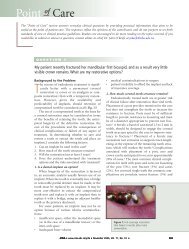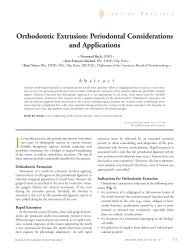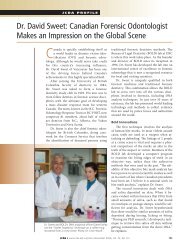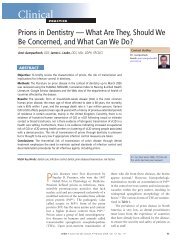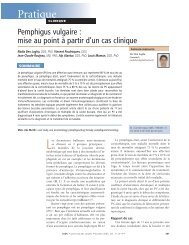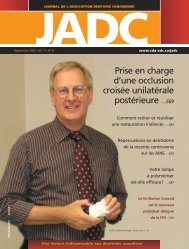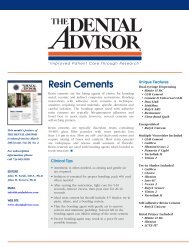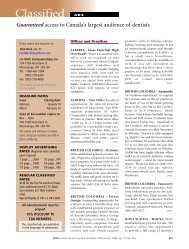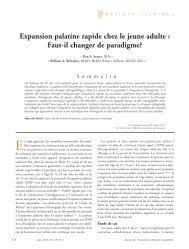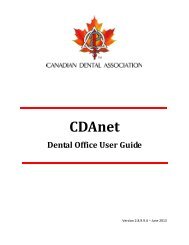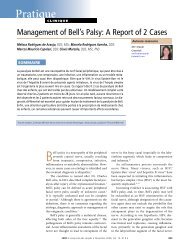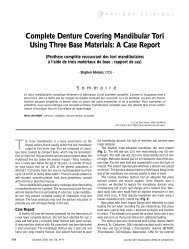JCDA - Canadian Dental Association
JCDA - Canadian Dental Association
JCDA - Canadian Dental Association
Create successful ePaper yourself
Turn your PDF publications into a flip-book with our unique Google optimized e-Paper software.
––– Ethical Predicament –––<br />
Table 1 Ethical guidelines dentists should follow to be ethical caregivers<br />
Category Guidelines<br />
Autonomy The patient has the right to choose, on the basis of adequate information, from alternative treatment plans<br />
that meet professional standards of care. The dentist’s preferred treatment plan may or may not be the<br />
patient’s chosen treatment plan. 19<br />
Veracity The dentist has a duty to communicate truthfully. 17<br />
• Cost<br />
Dentistry often offers treatment choices with a range of costs. Each appropriate treatment alternative<br />
must be presented with its associated costs and benefits. 19<br />
• Choice of treatment<br />
The dentist must discuss treatment recommendations, including benefits, prognosis and risks, reasonable<br />
alternatives and associated costs, to allow the patient to make an informed choice. The dentist must<br />
inform the patient whether the proposed oral health care involves treatment, techniques or products<br />
that are not generally recognized or accepted by the dental profession. 19<br />
• Provision of information<br />
The dentist is obligated to provide patients with fair comment and opinion about their oral health. 19<br />
Justice The dentist must remember his or her duty of service to patients and therefore is responsible to provide<br />
care for all members of society. A dentist shall not exclude, as patients, members of society on the basis of<br />
discrimination, which may be contrary to applicable human rights legislation. 19<br />
Beneficence The dentist has a duty to promote the patient’s welfare and to do no harm (principle of nonmaleficence). 17<br />
• Research and development<br />
When the results and benefits of their investigations safeguard or promote the health of the public, dentists<br />
are obligated to make them available to everyone. 17<br />
because the relationship between health professionals<br />
and patients is built upon trust. 13,14 According to the Code<br />
of Medical Ethics of the American Medical <strong>Association</strong><br />
about new medical procedures, physicians must share<br />
their skills and knowledge with patients and inform them<br />
of the results of clinical and laboratory research. 15 Jane B.<br />
Levin, Esq., explains that “ethically and morally, practitioners<br />
should inform their patients of their knowledge<br />
of alternative treatments. Ethically, [health professionals]<br />
should be obligated to advise patients that other treatments<br />
are available, even if they can’t necessarily afford<br />
them.” (2007 interview) Dentists are obligated to complete<br />
continuing education courses to learn about new,<br />
alternative treatments. This responsibility supports the<br />
patients’ right to self-determination, which is based on<br />
being informed about a proposed procedure and about<br />
any and all reasonable alternatives to it. 16,17 Nondisclosure<br />
of medical information to patients without their knowledge<br />
or consent (therapeutic privilege) 16,18 is justified<br />
morally and ethically only when the situation is an emergency<br />
or when the information is counter-therapeutic<br />
and its disclosure could cause the patient greater physical<br />
or psychological harm than if the information were not<br />
disclosed, 16 a rare situation in dentistry.<br />
Being aware of new advancements does not mean that<br />
dentists must actually implement all new procedures.<br />
They can choose not to and refer their patients to colleagues,<br />
but, at minimum, dentists must inform their<br />
patients about new procedures. 10 When a dentist decides<br />
to use a new technology, he or she must thoroughly<br />
understand the technology, and be prudent and competent<br />
in its use. 10<br />
Like any other emerging technology, new equipment<br />
and techniques in dentistry tend to cost more; some may<br />
argue that disclosing such luxury treatments to a patient<br />
can be unnecessarily cruel. 16 However, Dr. Cooney,<br />
chief dental officer of Canada, reminds us that clinicians<br />
should not take it upon themselves to deny such treatments<br />
to a patient and that it is very difficult to predict<br />
a patient’s financial situation in 10 years. Dr. Cooney advises<br />
dentists to inform their patients about their options<br />
for treatment, including the more expensive alternatives,<br />
so that if, in the future, the patient is in a better financial<br />
situation, he or she will be aware of the possibilities (2007<br />
interview). Of course, dentists must use their professional<br />
judgment about the patient’s circumstances, but disclosure<br />
of information should always be favoured. 16<br />
To be ethical caregivers, dentists should be guided by<br />
ethical principles. These are listed in Table 1. If a patient<br />
<strong>JCDA</strong> • www.cda-adc.ca/jcda • September 2008, Vol. 74, No. 7 • 633



